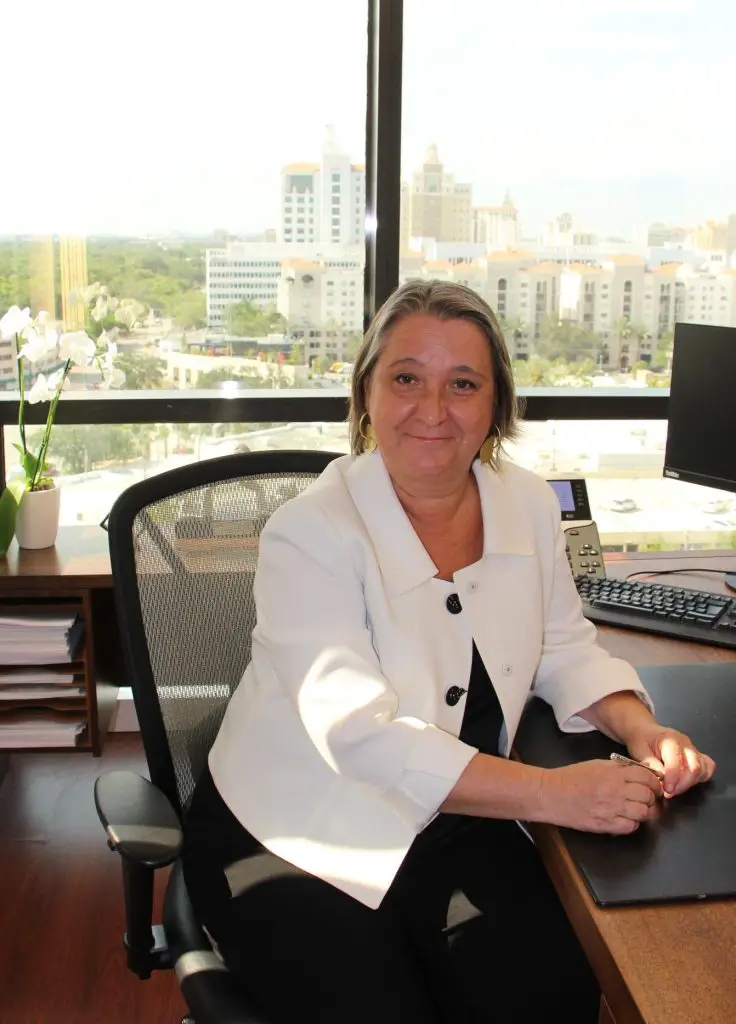Click here to get this post in PDF
Navigating the complexities of entering the US market can be daunting for foreign companies.
However, using a strategic approach, businesses can realize their dream of success in North America.
“There is no reason if you follow the right path, it is possible to navigate and thrive as a business in America,” says Rocamador Rubio Gómez.
“There are many opportunities and some wonderful businesses to collaborate with.”
Rocamador’s method, coupled with her dedication and expertise, continues to change lives and foster successful business relationships.
It has paved the way for numerous companies to establish a strong presence in the US.
As the Director of the Department of Ceramic Tile, Natural Stone, Building Materials and Furnishings at the Trade Commission of the Spanish Embassy in Miami, Rubio Gómez is an expert in international trade and expansion, working with foreign companies to enable them to succeed in the US market.
She has developed proven methods to help Spanish companies succeed in the competitive American landscape. Her expertise and strategic approach have helped numerous companies establish a strong presence in the US.
Image credit: Janine Elson
Born in Bilbao, in the Basque Country region of northern Spain, Rocamador’s journey began in a family with limited economic resources: “I think growing up in a family with limited economic resources made me want to study economics.
Probably to understand and alleviate the economic limitations of many people,” she reflects. Her passion for economics led her to specialize in international economics and economic development, which set the stage for her remarkable career.
Rocamador says she loves the sense of accomplishment and success that comes from helping companies achieve their goals. Additionally, she takes great pride in mentoring interns who have been part of her team over the years, fostering the next generation of trade and promotion specialists.
In this article, Rocamador discusses her proven methods which enable companies to forge strong relationships and beneficial partnerships in the US.
Proven Methods for Success
Comprehensive Market Research and Analysis
One of the most critical steps for any company looking to invest and build business relationships in the US is conducting thorough market research and analysis. Understanding the market landscape, including key players, competitive dynamics, consumer preferences, and regulatory requirements, is essential for making informed decisions. Companies should invest in detailed market studies to identify opportunities and potential challenges. Utilizing data analytics and market intelligence tools can provide deeper insights into market trends and customer behavior, enabling companies to tailor their strategies effectively.
“Understanding the market landscape, the key players, and the target audience’s specific needs is essential. Comprehensive research helps identify opportunities and potential challenges,” says Rocamador.
Developing a Robust Market Entry Strategy
“A well-defined market entry strategy is crucial for success in the US: “Especially in the U.S., you need to be aware of your business’s dimensions and the market’s dimensions.
“It is imperative to create a strategy that considers the geographic area and type of customer you want to reach.
“This strategy should outline the company’s objectives, target markets, competitive positioning, pricing strategies, and marketing plans,” says Rocamador.
“Customizing the approach based on specific market conditions and the company’s goals is essential. Companies should consider entering the market through direct investment, partnerships, joint ventures, or franchising. Each approach has its benefits and risks, and the choice should align with the company’s overall business strategy.”
Building Strong Local Partnerships
Establishing strong local partnerships is vital for navigating the US market: “Collaborating with local businesses, distributors, and industry stakeholders can provide valuable insights, enhance market reach, and facilitate smoother operations,” reveals Rocamador.
“Local partners can help navigate regulatory requirements, cultural nuances, and business practices, which can significantly differ from those in the company’s home country.
“Creating an optimal B2B relationship between foreign and US companies is at the core of a successful strategy. Assisting numerous companies in navigating distribution and retail channels, as well as forging connections with product specifiers, is key.
‘It is also important to learn which trade events, conferences summits or symposiums you should attend. These are one of the best platforms for networking and finding the right business partners,” she adds.
Compliance with Regulatory Requirements
The US market is characterized by a complex regulatory environment with federal, state, and local regulations. Ensuring compliance with these regulations is critical to avoid legal pitfalls and operational disruptions.
“Companies should invest in legal expertise to understand and navigate the regulatory landscape,” Rocamador reveals.
“This includes compliance with labor laws, environmental regulations, tax codes, and industry-specific standards. Regular audits and continuous monitoring of regulatory changes can help companies stay compliant and mitigate risks.
Leveraging Trade Missions and Programs
Participating in trade missions and government-sponsored programs can be highly beneficial for companies looking to enter the US market. These initiatives provide opportunities to network with potential partners, gain market insights, and showcase products and services.
Programs such as the SelectUSA Investment Summit offer a platform for international companies to connect with US economic development organizations and explore investment opportunities: “Engaging in these programs can enhance a company’s visibility and credibility in the market,” Rocamador says.
“Each year, trade commissions and trade offices like ours work with U.S. organizations and economic development agencies to identify business opportunities from the local to the state or federal levels
‘As well as this, we encourage businesses to utilize the benefits of getting involved with U.S. trade and professional associations, and the local chambers of commerce.
“Implementing relationships with these type of organizations, as well as trade missions and programs, such as the Tile of Spain program and the Passport to Creativity Tour to Spain, has significantly expanded the presence of Spanish companies in the USA,” she adds.
Effective Public Relations and Marketing
An effective public relations (PR) and marketing strategy is essential for building brand awareness and establishing a strong market presence: “Companies should invest in integrated marketing campaigns that leverage various channels, including digital marketing, social media, traditional media, and trade shows,” says Rocamador.
“PR efforts should focus on building a positive brand image, engaging with key stakeholders, and managing any potential reputational risks.
“Attending and exhibiting at major industry events and trade shows can provide significant exposure and networking opportunities.”
She adds: “Effective PR and marketing campaigns are vital. Managing the public relations and marketing campaigns for the Tile of Spain program ensures that the Spanish ceramic tile industry is well-represented at major trade shows like Coverings.”
Utilizing Technology and Innovation
Leveraging technology and innovation can drive efficiency and competitiveness in the US market. Implementing advanced IT systems, such as Enterprise Resource Planning (ERP) and Customer Relationship Management (CRM) software, can streamline operations, enhance customer service, and improve decision-making.
“Companies should also explore innovation opportunities in product development, service delivery, and business processes. Investing in research and development (R&D) can create unique value propositions that differentiate the company from its competitors,” says Rocamador.
Commitment to Sustainability
“A strong commitment to sustainability can enhance a company’s reputation and appeal to socially conscious consumers and partners,” says Rocamador.
“Companies should integrate sustainable practices into their operations, such as reducing carbon emissions, minimizing waste, and using eco-friendly materials.”
Demonstrating a commitment to corporate social responsibility (CSR) through community engagement and ethical business practices can build stakeholder trust and loyalty.
Continuous Support and Adaptation
Finally, providing continuous support and being adaptable to changing market conditions are essential for long-term success. Companies should offer ongoing training and development for their teams to ensure they are equipped with the latest skills and knowledge.
“Regularly reviewing and adapting strategies based on market feedback and performance metrics can help companies stay competitive and responsive to market changes,” says Rocamador.
“Engaging with customers and partners to gather insights and address their evolving needs is key to building strong, lasting business relationships.
“Providing ongoing support and guidance is vital to help companies navigate the US market landscape effectively,” she emphasizes.
By implementing these proven methods, companies can enhance their efficiency, build successful business relationships, and achieve sustained growth in the US market.
Rocamador says these strategies can enable foreign companies to succeed in the US market and have helped Spanish companies achieve a foothold in northern American markets.
“I enjoy doing this work,” she says. “It is very rewarding to be involved in so many endeavors of companies that successfully contribute to this thriving economy and are part of the most open business ecosystem in the world,” she shares.
“My ultimate goal is to contribute to the prosperity and wealth of the US and Spanish economies and the well-being of the people involved in this process.”
About Rocamador Rubio Gómez
Rocamador Rubio Gómez is a recognized authority in the economic and business landscapes of both the United States and Spain.
With a strategic focus on enhancing trade, fostering robust business relationships, driving market penetration, and attracting investment in the construction and design industries, Rocamador’s expertise is highly sought after. Her insights and strategies are frequently featured in leading trade publications and industry reports.
As Director of the Department of Ceramic Tile, Natural Stone, Building Materials, and Furnishings at the Trade Commission of Spain in Miami since April 2001, Rocamador designs and executes comprehensive promotional programs.
Fluent in English, Portuguese and Spanish, her mastery in planning and coordinating activities spans multiple sectors, including ceramic tile, natural stone, wood flooring, windows, and doors, catering to both residential and commercial markets.
She is adept at managing substantial annual budgets, ensuring departmental goals are met efficiently, and spearheading the Tile of Spain program, significantly boosting the visibility and success of Spanish ceramic tiles in the U.S. market.
Rocamador’s exceptional skills in trade show planning and organization are evident through her management of premier events such as Coverings, KBIS and Builders Show, AIA, NeoCon, and HD Expo.
She excels in guiding Spanish companies through U.S. distribution channels and establishing strategic partnerships within the building materials, kitchen and bath, home furnishings, architecture, and interior design sectors. Rocamador’s proficiency in conducting market research and analysis is instrumental in facilitating the smooth entry of Spanish companies into the U.S. market, and she expertly coordinates business meetings between Spanish and U.S. companies. Rocamador leverages advanced IT tools, including SAP and CRM, to optimize budget management and customer relationships.
In her previous role as Head of the Machinery and Industrial Technologies Department at the Trade Commission of Spain in São Paulo, Brazil, from March 1997 to March 2001, Rocamador managed the ICEX Business Center and orchestrated high-impact trade missions and shows.
Her foundational career experience includes a pivotal internship at the ICEX Program in São Paulo, where she played a key role in organizing Expo Tecnia 96, engaging 400 Spanish companies across 15 industrial sectors.
Rocamador holds a Master’s degree in Economic and Business Science and a Postgraduate University Diploma in Commercial Management of Exports and International Marketing from the University of the Basque Country (Bilbao, Spain).
You may also like: The Future of Finance: How AI Is Transforming Banking Communication
Image source: DepositPhotos.com


